Apparently it is known Jenkins "issue" or "hidden secret" https://issues.jenkins.io/browse/JENKINS-41929.
I overcome this automatically using Jenkins Job DSL plugin.
I have Job DSL's seed job for my pipelines checking for changes in git repository with my pipeline.
pipelineJob('myJobName') {
// sets RELOAD=true for when the job is 'queued' below
parameters {
booleanParam('RELOAD', true)
}
definition {
cps {
script(readFileFromWorkspace('Jenkinsfile'))
sandbox()
}
}
// queue the job to run so it re-downloads its Jenkinsfile
queue('myJobName')
}
Upon changes seed job runs and re-generate pipeline's configuration including params. After pipeline is created/updated Job DSL will queue pipeline with special param RELOAD.
Pipeline than reacts to it in first stage and abort early. (Apparently there is no way in Jenkins to abort pipeline stop without error at the end of stage causing "red" pipeline.)
As parameters in Jenkinsfile are in properties, they will be set over anything set by seed job like RELOAD. At this stage pipeline is ready with actual params without any sign of RELOAD to confuse users.
properties([
parameters([
string(name: 'PARAM1', description: 'my Param1'),
string(name: 'PARAM2', description: 'my Param2'),
])
])
pipeline {
agent any
stages {
stage('Preparations') {
when { expression { return params.RELOAD == true } }
// Because this: https://issues.jenkins-ci.org/browse/JENKINS-41929
steps {
script {
if (currentBuild.getBuildCauses('hudson.model.Cause') != null) {
currentBuild.displayName = 'Parameter Initialization'
currentBuild.description = 'On first build we just load the parameters as they are not available of first run on new branches. A second run has been triggered automatically.'
currentBuild.result = 'ABORTED'
error('Stopping initial build as we only want to get the parameters')
}
}
}
}
stage('Parameters') {
steps {
echo 'Running real job steps...'
}
}
}
End result is as such that every time I update anything in Pipeline repository, all jobs generated by seed are updated and run to get updated params list. There will be message "Parameters initialization" to indicate such a job.

There is potentially way how to improve and only update affected pipelines but I haven't explore that as all my pipelines are in one repository and I'm happy with always updating them.
Another upgrade could be that if someone doesn't like "abort" with "error", you could have while condition in every other stage to skip it if parameter is RELOAD but I find adding when to every other stage cumbersome.
I initially tried @TomDotTom's answer but than I didn't liked manual effort.
